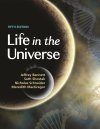Textbook
By: Jeffrey Bennett(Author), Seth Shostak(Author), Nicholas Schneider(Author), Meredith MacGregor(Author)
544 pages, 393 colour illustrations, 21 tables
![Life in the Universe Life in the Universe]()
Click to have a closer look
About this book
Contents
Customer reviews
Biography
Related titles
About this book
Are we alone in the cosmos? How are scientists seeking signs of life beyond our home planet? Could we colonize other planets, moons, or even other star systems? This introductory textbook, written by a team of four renowned science communicators, educators, and researchers, tells the amazing story of how modern science is seeking the answers to these and other fascinating questions. They are the questions that are at the heart of the highly interdisciplinary field of astrobiology, the study of life in the universe.
Written in an accessible, conversational style for anyone intrigued by the possibilities of life in the solar system and beyond, Life in the Universe is an ideal place to start learning about the latest discoveries and unsolved mysteries in the field. From the most recent missions to Saturn's moons and our neighbouring planet Mars to revolutionary discoveries of thousands of exoplanets, from the puzzle of life's beginning on Earth to the latest efforts in the search for intelligent life elsewhere, this book captures the imagination and enriches the reader's understanding of how astronomers, planetary scientists, biologists, and other scientists make progress at the cutting edge of this dynamic field. Enriched with a wealth of engaging features, this textbook brings any citizen of the cosmos up to speed with the scientific quest to discover whether we are alone or part of a universe full of life.
Contents
Preface
About the Authors
How to Succeed in Your Astrobiology Course
PART I Introducing Life in the Universe
1 A Universe of Life?
2 The Science of Life in the Universe
3 The Universal Context of Life
PART II Life on Earth
4 The Habitability of Earth
5 The Nature of Life on Earth
6 The Origin and Evolution of Life on Earth
PART III Life in the Solar System
7 Searching for Life in Our Solar System
8 Mars
9 Life on Jovian Moons
10 The Nature and Evolution of Habitability
PART IV Life Among the Stars
11 Exoplanets: Their Nature and Potential Habitability
12 The Search for Extraterrestrial Intelligence
13 Interstellar Travel and the Fermi Paradox
Epilogue: Contact—Implications for the Search and Discovery
Answers to Quick Quiz Questions
Appendixes
Glossary
Credits
Index
Customer Reviews
Biography
Jeffrey Bennett is an astrophysicist and educator whose publications include the bestselling textbook The Cosmic Perspective as well as an award-winning series of children’s books. Seth Shostak is a senior astronomer at the SETI Institute and the author of Confessions of an Alien Hunter. Nicholas Schneider is a professor of astrophysical and planetary sciences at the University of Colorado Boulder and coauthor of The Cosmic Perspective and other bestselling textbooks. Meredith MacGregor is an assistant professor of astrophysical and planetary sciences at the University of Colorado Boulder.
Textbook
By: Jeffrey Bennett(Author), Seth Shostak(Author), Nicholas Schneider(Author), Meredith MacGregor(Author)
544 pages, 393 colour illustrations, 21 tables
"This superbly written book explains the science in a lively way – just right for undergraduates without experience in astronomy or advanced mathematics. There are few texts that compete with Life in the Universe."
– Alan C. Calder, Stony Brook University, State University of New York
"I really like the broad scope of this book and its accessibility for nonscience majors. Life in the Universe is very strong as a general education undergraduate textbook, covering a wide range of relevant science in astrobiology and providing excellent content for the topics covered. There is something here for everyone."
– Rachel L. Smith, Appalachian State University
"Comprehensive and easy to read."
– Jacob L. Bean, University of Chicago
"This textbook is very user-friendly for nonscience majors who need to fulfill a science requirement, nicely blending well-written discussions and informative images."
– Melinda L. Hutson, Portland State University
"Life in the Universe presents this material in a way that is accessible to students with little to no physics background."
– Paul M. Robertson, University of California, Irvine


































